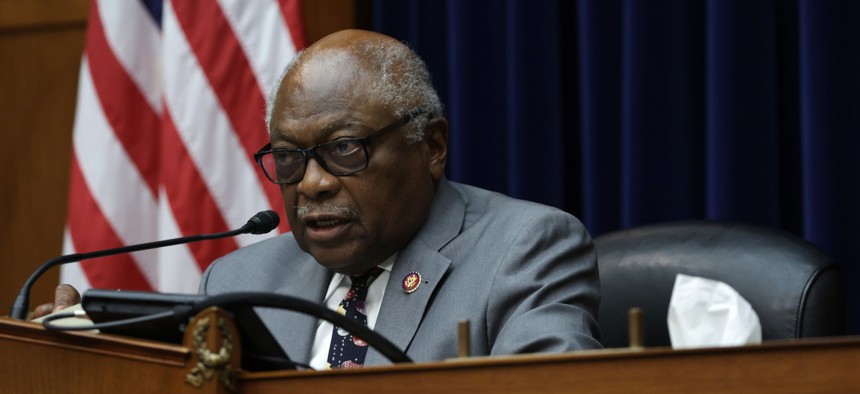
Rep. Jim Clyburn, D-S.C., chairman of the select subcommittee, said it's important to look ahead at what can be fixed before the next pandemic. Alex Wong/Getty Images
It’s the End of the House COVID Panel As We Know It
The majority of the panel has released its final report on the lack of preparations ahead of the pandemic, blunders by the Trump administration and recommendations for reform.
The nation was completely unprepared for the COVID-19 pandemic, and the Trump administration greatly mismanaged the initial response, a top lawmaker said on Wednesday. But almost three years into the pandemic, it’s important to look to the future, he said, by adapting his panel’s recommendations, including preventing political interference in the work of the federal science agencies.
The Democrats on the House Select Subcommittee on the Coronavirus Crisis released their final report on December 9, representing a culmination of the panel’s work since its establishment in April 2020. Then on Wednesday the panel hosted its final hearing during which witnesses discussed the report and the path forward, as well as its final business meeting to formally adopt the report. The entity’s fate is unclear in the new Congress when Republicans will hold the majority in the House.
“Our government entered the COVID crisis unprepared for its magnitude. Our nation’s public health infrastructure was underdeveloped,” said Rep. Jim Clyburn, D-S.C., chairman of the select subcommittee, at the hearing. “On top of these existing vulnerabilities, the previous administration chose to minimize the coronavirus and discourage proven health measures by undermining the scientists leading the pandemic response.”
Clyburn noted that this hearing was not just about looking back, but going forward, as the report gave 30 recommendations on mitigating risks still posed by COVID-19, better investing in the nation’s public health and economic relief infrastructure, preparing for future crises and safeguarding relief programs.
In response to issues during the Trump administration, one of the subcommittee’s recommendations is that the Health and Human Services Department develop procedures and train employees on how to report political interference, noting “if officials contemplating political interference within scientific decision-making are aware that it will be reported, they will be less likely to engage in it.”
Some of the specific instances of interference cited in the report are Trump White House officials blocking the Centers for Disease Control and Prevention from sharing accurate information with the public, manipulating guidance and installing political operatives at the agency in order to downplay the pandemic.
The panel also recapped how Trump officials tried to interfere with the Food and Drug Administration's authorization of COVID-19 vaccines and treatments and pressure agency officials to reauthorize the hydroxychloroquine as a COVID-19 treatment after it was deemed to be ineffective, among other things.
Ahead of a hearing the panel held in April, the Government Accountability Office issued a report about gaps in how the major federal health agencies address scientific integrity policy violations. Nevertheless, the subcommittee report noted that upon coming into office, President Biden worked to restore the public’s trust in the federal government, by having science lead the pandemic response.
“We had a narrow window of opportunity to build a defense and mount an attack against COVID,” but early on the Trump administration was “chaotic and reckless” in its response, Dr. Rick Bright, ousted federal vaccine director turned whistleblower, said on Wednesday, echoing what he had testified in May 2020.
Bright noted it’s important to recognize what went right with the pandemic response, such as Operation Warp Speed, a public-private partnership launched under the Trump administration to accelerate the development of COVID-19 vaccines, treatments and tests, and document this for future use.
“Despite these successes, our long under-funded healthcare system buckled under the ravages of COVID,” Bright said. He called on Congress to authorize a nonpartisan commission to review the COVID-19 response to prepare for future emergencies. As The New York Times reported earlier this week, efforts have stalled to enact a 9/11-style commission to investigate the pandemic response in an independent manner, unlike the partisan reviews from Congress.
When asked about the White House’s position on establishing such a commission during the briefing on Tuesday, White House Press Secretary Karine Jean-Pierre said she didn’t have anything to add beyond what her predecessor Jen Psaki, who left in May, had said. Psaki said in February 2021 that a decision on such a commission should be left up to Congress.
Adm. Brett Giroir, who served as HHS assistant secretary for health under the Trump administration and testing czar, told the select subcommittee that going forward there shouldn’t be a need for a testing czar or Operation Warp Speed. “We can avoid that if we develop long-term, sustainable, public-private partnerships, if we reform the unfocused, slow, insular and operationally unprepared federal agencies, especially, unfortunately, the CDC.”
Giroir also criticized the subcommittee for focusing too much on “political scapegoating” in their report and not enough on biosafety. He stated, “there is a critical difference between politicization of the science and political leadership of the scientific agencies.”
As Republicans plan their investigations, they are still debating the future of the COVID-19 panel, Politico reported last week.
Rep. Steve Scalise, R-La., ranking member of the select subcommittee, said in a statement on Friday the final report “is further proof that Democrats’ sham panel never was about impartial oversight, it was purely about politics” and blasted the Democrats for not looking into the Biden administration’s pandemic response.
He added, “when Republicans have the majority [in the] next Congress, we will hold the Biden administration and other government officials accountable for their devastating actions, and advance bills to protect hard-working families from future government abuse and mismanagement.”







